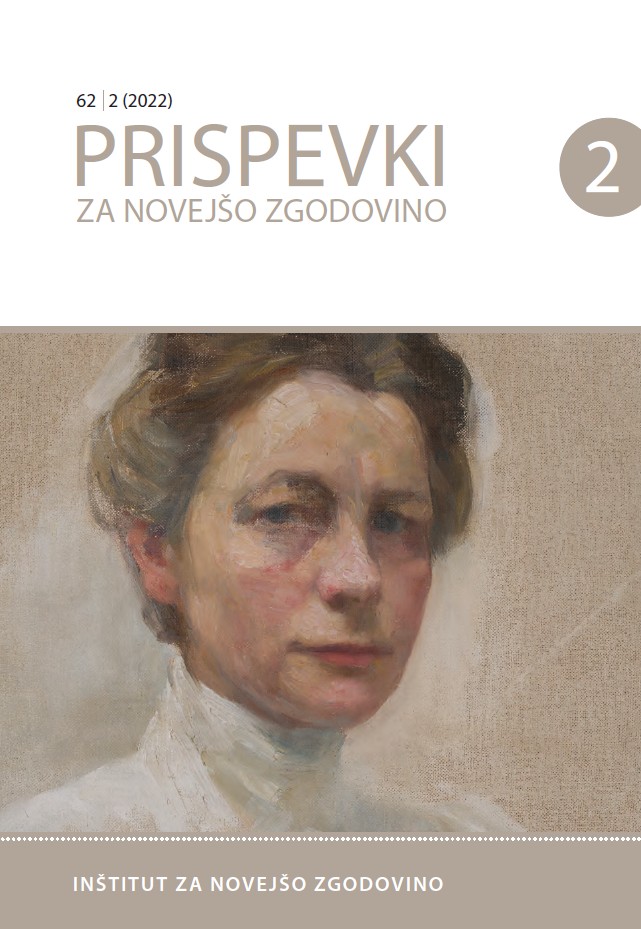Uspon i pad komandno-planske privrede u Jugoslaviji (1947−1951)
DOI:
https://doi.org/10.51663/pnz.62.2.07Ključne besede:
Jugoslavija, ZSSR, centralno plansko gospodarstvo, KPJ, Zvezna planska komisijaPovzetek
Uspon i pad komandno-planske privrede u Jugoslaviji (1947−1951)
Apstrakt: Radikalna transformacija društva koja je započela u Jugoslaviji 1945. godine imala je endogene i egzogene korene. Komunistička partija Jugoslavije je pobedom u ratu došla u priliku da kreira nove pravce razvoja jugoslovenskog društva. Ideološka zagledanost u Sovjetski Savez i nepostojanje sopstvenih iskustava opredelili su izbor modela razvoja. Tako je upravljanje privredom po komandno-planskim principima razvijenim u SSSR-u postalo jedan od najvažnijih segmenata jugoslovenske rešenosti da izgradi socijalizam. Raskid sa sovjetima leta 1948. godine prouzrokovao je promenu odnosa prema svemu što je dolazilo iz Moskve, a time je i nastavak sprovođenja centralno-planskog privrednog modela doveden u pitanje. Ovaj rad će pružiti uvid u postanak, razvoj i nestanak makroekonomskog planiranja u privredi tokom rane etape jugoslovenskog socijalizma.
Ključne reči: Jugoslavija, SSSR, komandno-planska privreda, KPJ, Savezna planska komisija
Literatura
Arnold, N. Scott. »Marx, Central Planning, and Utopian Socialism.« Social Philosophy and Policy. Vol. 6. Issue 2, (1989): 160−99.
Bakarić, Vladimir. Ekonomski i politički aspekt socijalističkog samoupravljanja. Sarajevo: Svjetlost, 1975.
Berend, T. Ivan. Ekonomska istorija Evrope u XX veku, Ekonomski modeli od laisses-faire do globalizacije. Beograd: Arhipelag, 2009.
Bilandžić, Dušan. Kratak pregled razvitka društveno-ekonomskih odnosa u SFRJ 1945−1965. Beograd: Centar za ideološko-političko obrazovanje Radničkog univerziteta "Đuro Salaj", 1965.
Boffa, Giuseppe. Povijest Sovjetskog Saveza, Od Revolucije do Drugog svjetskog rata, Lenjin I Staljin (1917–1941). I–II. Opatija: Otokar Keršovani, 1985.
Boobbyer, Philip. The Stalin Era. London and New York: Routledge, 2000.
Bottomore, Tom. The Socialist Economy, Theory and practice. Worcester: The Guilford Press, 1990.
Brown, Archie. The Rise and Fall of Communism. New York: Harper Collins Publishers, 2009.
Brutzkus, Boris. Economic Planning in Soviet Russia. London and New York: Routledge, 2000.
Данилов, Виктор Петрович. »К вопросу о понимании нэпа.« U: НЭП: экономические, политические и социокультурные аспекты. отв. редактор Александр Спартакович Сенявский. Москва: РОССПЭН, 2006.
Davies, Robert William. »Changing Economic Systems: an Overview.« U: The Economic Transformation of the Soviet Union, 1913–1945. Ur. Harrison, Mark, Wheatcroft G. Stephen in Davies W. Robert. Cambridge: Cambridge University Press, 1994. 1−23.
Davies, W. Robert. »Economic and Social Policy in the USSR, 1917—41.« U: The Cambridge Economic History of Europe, The Industrial Economies: the Development of Economic and Social Policies. Peter, Mathias in Sidney Pollard, 984−1047. Cambridge: Cambridge University Press, 1989.
Davies, W. Robert. Soviet Economic Development from Lenin to Khrushchev. Cambridge: Cambridge University Press, 1998.
Day, B. Richard. Leon Trotsky and the Politics of Economic Isolation. Cambridge: Cambridge University Press, 1973.
Dedijer, Vladimir. Novi prilozi za biografiju Josipa Broza Tita. Beograd: Rad, 1984.
Hanson, Philip. The Rise and Fall of the Soviet Economy, An Economic History of the USSR from 1945. New York: Routledge, 2014.
Horvat, Branko. Privredni sistem i ekonomska politika Jugoslavije: problemi, teorije, ostvarenja, propusti. Beograd: Institut ekonomskih nauka, 1970.
Истер, М. Джералд. Советское государственное строительство, Система личных связей и самоидентификация елиты Росии. Москва: РОССПЭН, 2010.
Carr, H. Edvard. Ruska revolucija, Od Lenjina do Staljina (1917–1929). Zagreb: Globus, 1984.
Janos Kornai. The Socialst System, The Political Economy of Communism. Oxford: Oxford University Press, 1992.
Lenjin, Ilič Vladimir. Imperijalizam kao poslednji stadij kapitalizma. Beograd: Rad, 1960.
Lenjin, Ilič Vladimir. Izabrana dela (novembar 1917 – februar 1919). I–XVI. Beograd: Rad, 1960.
Lenjin, Ilič Vladimir. Protiv oportunizma i „ljevičarstva“. Sarajevo: Svjetlost, 1976.
Marsenić, V. Dragutin. Odnosi akumulacije i potrošnje u jugoslovenskoj privredi. Beograd, Naučna knjiga: 1969.
Madžar, Ljubomir in Aleksandar Jovanović. Osnovi trorije razvoja i planiranja. Beograd: Savremena administracija, 1995.
Nove, Alec. Stalinism and After, The Road to Gorbachev. London and New York: Routledge, 1989.
Obolenski, Dimitrije in Robert Oti. Istorija Rusije. Beograd: Klio, 2003.
O petogodišnjem planu (članci i predavanja). Beograd, 1947.
Pašić, Najdan in Kiro Hadži Vasilev. »Komunistička partija Jugoslavije u borbi za izgradnju temelja socijalizma i za odbranu nezavisnosti Jugoslavije (1945−1948).« U: Pregled istorije Saveza komunista Jugoslavije. urednik Čolaković, Rodoljub. Beograd: Institut za izučavanje radničkog pokreta, 1963.
Rakonjac, Aleksandar. »Počeci privrednog planiranja U Jugoslaviji 1946. godine – Ideje, organizacija i institucionalizacija.« Tokovi istorije, 2 (2016): 151−76.
Соловьёв, Кири́лл Андре́евич. »В революциях и войнах. 1883−1920 гг.« U: История Комунистической партии Советского Союза. отв. редактор Безбородов, Александр Борисович, 146−60. Москва: РОССПЭН, 2013.
Tomasic, A. Dinko. »The Problem of Unity of World Communism.« Marquette University Slavic Institute Papers, No. 16. (1963): 1−31.
Objavljeno
Številka
Rubrika
Licenca
Avtorji prispevkov, objavljenih v tej reviji, soglašajo z naslednjimi pogoji glede avtorskih pravic:
- Avtorji ohranijo avtorske pravice, reviji pa odobrijo pravico do prve objave. Delo se hkrati zaščiti z licenco za prosto uporabo avtorskih del (Creative Commons Attribution License), ki drugim osebam omogoča deljenje dela ob priznanju avtorstva in prve objave v tej reviji.
- Avtorji lahko sklenejo ločene dodatne pogodbene dogovore za neizključno distribucijo različice dela, objavljene v reviji, (npr. oddaja v institucionalni repozitorij ali objava v knjigi) z navedbo, da je bilo delo prvič objavljeno v tej reviji.
- Pred postopkom pošiljanja in med njim lahko avtorji delo objavijo v spletu (npr. v institucionalnih repozitorijih ali na svoji spletnih strani), k čemer jih tudi spodbujamo, saj lahko to prispeva k plodnim izmenjavam ter hitrejšemu in obsežnejšemu navajanju objavljenega dela (glej The Effect of Open Access).


